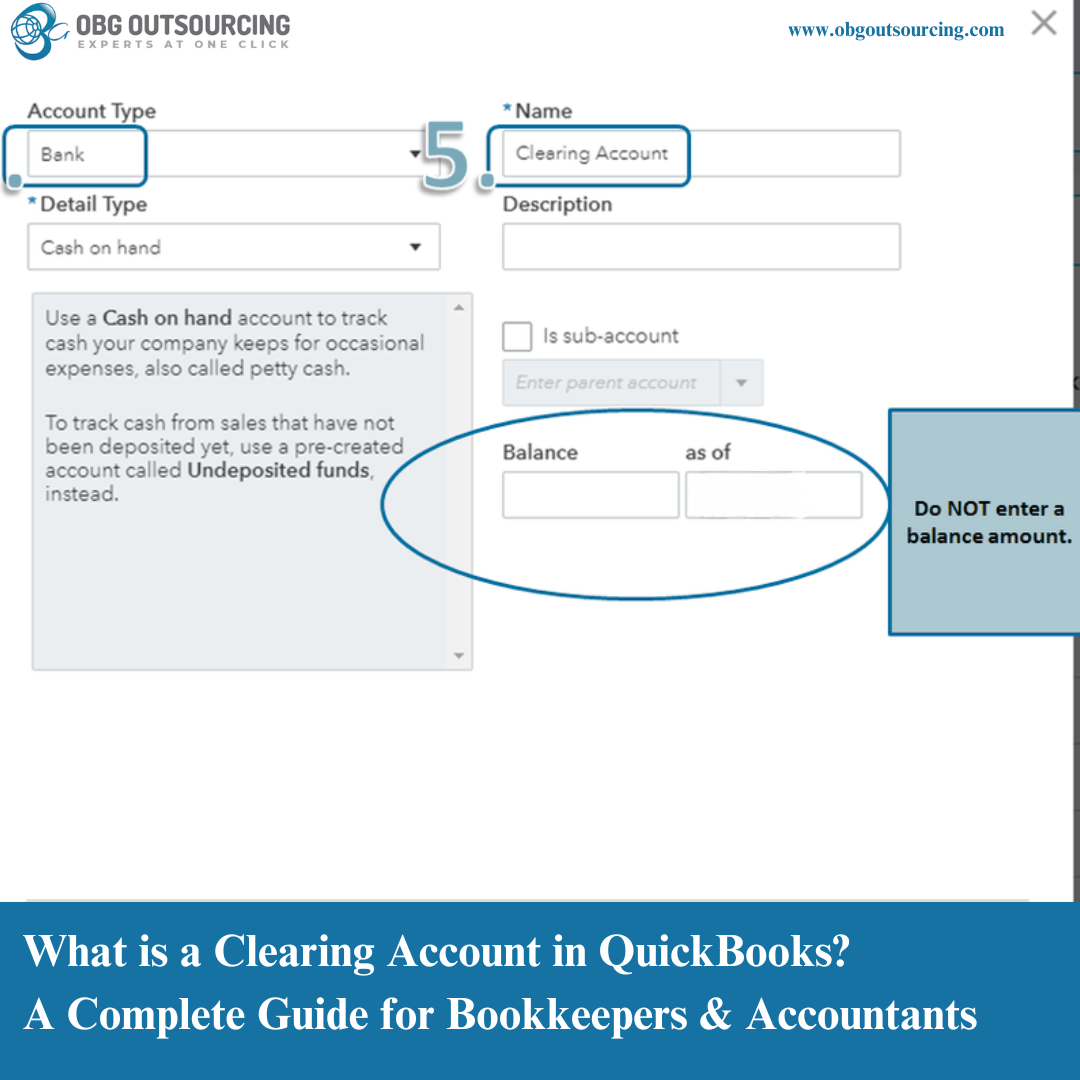If you are a bookkeeper or accountant using QuickBooks, understanding the role of a clearing account is essential. Many users are unsure of what is a clearing account in QuickBooks, how to use it properly, and what to do when it shows an unexpected balance.
In this complete guide, we will explain what is a clearing account in accounting, what type of account it should be, when to use one, how a payroll clearing account works, and how to avoid common mistakes. We will also show how expert services like OBG Outsourcing can help you manage clearing account accounting with confidence.
What is a Clearing Account in Accounting?
A clearing account in accounting is a temporary holding account used to move money between different accounts. It helps organize transactions that are in progress or need further classification before being posted to their final destination.
You may also hear it called a wash account or suspense account. In QuickBooks, clearing accounts help keep your financial records clean by holding funds until they are ready to be applied correctly.
What is a Clearing Account in QuickBooks?
In QuickBooks, a clearing account is a tool used to move money from one area to another without directly affecting financial reports. For example, you might use a clearing account to transfer money between bank accounts, hold unmatched deposits, or process payroll entries.
Understanding what is a clearing account in QuickBooks allows bookkeepers to track incomplete transactions while maintaining accurate and organized records.
What Type of Account is a Clearing Account?
QuickBooks typically sets up a clearing account as a bank type or other current asset account. Although it is not a real bank account, assigning it as a bank type helps with ease of transfers and journal entries.
The key purpose of a clearing account is to temporarily hold money before it is assigned to the appropriate income, expense, asset, or liability category.
What is a Payroll Clearing Account?
A payroll clearing account is a specific kind of clearing account used to track payroll entries in QuickBooks. When payroll is processed, the gross wages, taxes, and other deductions are first posted to the payroll clearing account.
Once the actual payments are made to employees and tax agencies, the payroll clearing account should be cleared to zero. This ensures that your books match your payroll reports without overreporting expenses or liabilities.
When is a Clearing Account Used?
Here are common use cases where you might use a clearing account in accounting:
Payroll Transactions: A payroll clearing account temporarily holds wage and tax amounts until disbursement
Customer Payments: When funds are received but not yet deposited or matched in the bank
Transfers Between Accounts: Useful when moving money between accounts that are not linked
Currency Conversions: A clearing account helps manage foreign currency transactions before final posting
Unassigned Funds: When payments or expenses are received but not yet categorized
Understanding when is a clearing account used can prevent errors and keep your QuickBooks file accurate and audit ready.
Common Mistakes in Clearing Account Accounting
Although clearing accounts are powerful tools, bookkeepers and accountants often misuse them. Here are the most common mistakes:
Not Clearing the Balance
A clearing account should always return to a zero balance. If it contains old transactions or open entries, it can cause confusion in your books.
Using It as a Permanent Account
A clearing account should never be used as a long term holding account. It is only for short term transaction management.
Incorrect Categorization
Misclassifying transactions within the clearing account can distort profit and loss or balance sheet figures.
No Audit Trail
Without documentation, it is difficult to track why money was moved into or out of the account.
Failing to Reconcile
Regular reconciliation ensures the clearing account does not accumulate unexplained balances.
How to Fix Clearing Account Issues in QuickBooks
If your QuickBooks clearing account shows an unexpected balance or contains old transactions, here is how to fix it:
Review the Account: Go to the chart of accounts and inspect all entries for accuracy and classification
Reassign Transactions: Move funds to their correct accounts, such as income or expense categories
Reconcile Regularly: Ensure the account clears to zero monthly
Avoid Duplication: Check for duplicate entries caused by incorrect transfers or imports
Document Transfers: Always maintain notes or memos for clarity
How OBG Outsourcing Helps You Manage Clearing Accounts
At OBG Outsourcing, we specialize in accurate and efficient clearing account accounting for bookkeepers and accountants. Whether you need help with a payroll clearing account or general QuickBooks cleanups, we have you covered.
QuickBooks Expertise: We understand what is a clearing account in QuickBooks and how to use it properly
Error-Free Books: We identify and fix clearing account issues to keep your reports clean
Customized Support: We tailor our services to your industry, transaction volume, and accounting needs
Ongoing Reconciliation: We make sure your clearing account does not impact your financial accuracy
Final Thoughts
Knowing what is a clearing account in QuickBooks, what type of account it should be, and how to use it correctly is essential for bookkeepers and accountants. A payroll clearing account adds another layer of clarity when managing wage and tax payments.
By understanding how and when to use a clearing account in accounting, you can avoid common mistakes and keep your financial data accurate and audit ready.
For professional help with QuickBooks and clearing account accounting, reach out to OBG Outsourcing. We are here to help you stay organized, compliant, and stress free.
 USA
USA UK
UK Australia
Australia UAE
UAE Canada
Canada

_(7).jpg)
_(6).jpg)


_(5).jpg)
.jpg)
_(4).jpg)
_(1).jpg)
_(2).jpg)
.png)